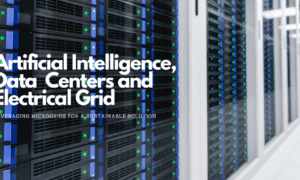Puerto Rico is no stranger to the devastating effects of climate change. With hurricanes and extreme weather events becoming increasingly common, the island has struggled to maintain a stable and reliable energy grid. In the wake of Hurricane Maria, which left many without power for months, researchers are exploring alternative solutions to address the energy poverty and climate change crisis facing Puerto Rico.
A recent study by Dr. Debashish Roy highlights how microgrids and AI can provide a viable solution to these two major issues. Microgrids are local energy systems that operate independently from the main power grid, consisting of distributed energy resources like solar panels, wind turbines, and energy storage systems. Combining these resources with AI algorithms allows the energy system to adjust to shifting energy needs and environmental conditions while minimizing waste and cutting carbon emissions.
The Rocky Mountain Institute, in partnership with the Clinton Foundation and the United Nations Foundation,New Research Shows Microgrids and AI can Tackle Energy Poverty and Climate Change.The case study of Puerto Rico, where Hurricane Maria severely damaged the power grid and left many towns without energy for months, is highlighted in the report.
To put their research into practice, the team created a microgrid system on Vieques, a small island off the coast of Puerto Rico. The system combines solar panels, batteries, and backup diesel generators to deliver dependable and sustainable electricity to the population. The AI algorithms analyze meteorological data, energy demand, and available energy resources to optimize system performance and reduce energy waste.
The study’s findings were noteworthy, as the microgrid system gave the Vieques population dependable, sustainable electricity even during blackouts brought on by extreme weather. The system improved energy resilience and efficiency while reducing carbon emissions and energy waste.
By supplying communities and buildings with dependable and environmentally friendly electricity, intelligent energy systems like microgrids and AI can lessen reliance on the main power grid and save carbon emissions. Adopting microgrids and AI can boost the growth of the renewable energy sector and open up job prospects. Puerto Rico’s private energy system is taking steps toward combating climate change and creating a sustainable future for the island’s energy needs.
A new research study by Dr. Debashish Roy highlights the potential of microgrid solutions to address both energy poverty and climate change. Microgrid solutions, coupled with modern advancements in technology like artificial intelligence and machine learning, can offer an effective way to improve overall energy pollution.
The research focuses on applying reinforcement learning (RL) algorithms in an islanded microgrid configuration to optimize the operational cost and improve grid reliability. The study is based on developing a RL framework around the islanded microgrid, building the microgrid’s simulation model, testing the model with sample datasets, and performing high-level comparative analysis using two RL agent models (single agent and multi-agent model).
The research provides a practical framework to apply the reinforcement learning model in energy management space in an island microgrid model with a complex energy flow network. It also demonstrated how user perspective and quality of experience can be embedded into the solution. Both single-agent and multi-agent systems have shown promising energy management results for an islanded microgrid network. During energy scarcity, intelligent agents successfully managed the energy flow to fulfill user preferences. The agent has also shown the ability to prioritize the performance of the connected devices in the island microgrid network based on user preferences.
This research has the potential to be adapted and improved with renewable technology, utilities, microgrid system design companies, or even companies interested in developing intelligent software solutions in energy management space, to enhance overall access to energy, eradicate energy poverty, support climate goals, and create value for society, stakeholders, and business entities.































